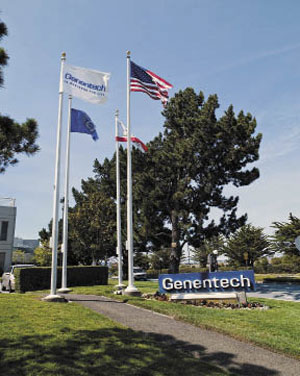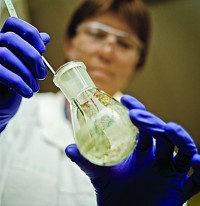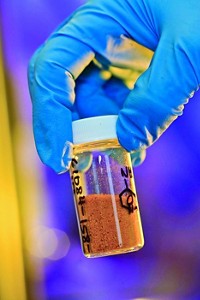Advertisement
Grab your lab coat. Let's get started
Welcome!
Welcome!
Create an account below to get 6 C&EN articles per month, receive newsletters and more - all free.
It seems this is your first time logging in online. Please enter the following information to continue.
As an ACS member you automatically get access to this site. All we need is few more details to create your reading experience.
Not you? Sign in with a different account.
Not you? Sign in with a different account.
ERROR 1
ERROR 1
ERROR 2
ERROR 2
ERROR 2
ERROR 2
ERROR 2
Password and Confirm password must match.
If you have an ACS member number, please enter it here so we can link this account to your membership. (optional)
ERROR 2
ACS values your privacy. By submitting your information, you are gaining access to C&EN and subscribing to our weekly newsletter. We use the information you provide to make your reading experience better, and we will never sell your data to third party members.
Business
Drug Firms Face Down Economy
Economic repercussions took a toll on first-quarter sales and earnings
by Ann M. Thayer
May 18, 2009
| A version of this story appeared in
Volume 87, Issue 20

THE GLOBAL financial decline that started in late 2008 slid even further during the first quarter of 2009. Most drug companies already had cost-cutting programs in place to lessen the brunt of an economic downturn, but as the crisis worsened, so, too, did the situation for their customers—people in need of health care.
In light of the deterioration, forecasters have altered their predictions for the industry's growth. Market research firm IMS Health revised its estimates in April, saying that the global pharmaceutical market would grow about 3% in 2009, or two percentage points less than what it had predicted in October 2008. This new level would mark record low sales growth for the industry worldwide and an actual 1–2% contraction in the U.S. market. Other mature geographic markets will grow only slowly, IMS said, while emerging markets will continue to expand at good rates.
"There is a clear correlation between demand for medicines and key macroeconomic variables" such as gross domestic product, consumer spending, and government expenditures, IMS Senior Vice President Murray L. Aitken said when the firm released its forecast. Economic issues are now an overlay to the all-too-familiar factors that already impede growth in the drug industry—patent expirations, fewer new product launches, and regulatory pressures.
"The economic crisis is adding another layer of complexity to an already challenging market environment," Aitken said. "To strengthen their resilience, pharmaceutical manufacturers must adapt their strategies and tactics—reevaluating their commercial models, pursuing opportunities in emerging markets, and strengthening the value propositions of their medicines in ways that resonate with payers and patients."
Belt-tightening succeeded only so far in helping to wring out earnings growth in the first quarter of 2009. Combined quarterly sales for the world's 13 leading drug companies dropped 0.7% and earnings rose just 1.3%. The overall profit margin rose slightly to a still-sizable 24.9%.
No drug company actually lost money, but in an industry accustomed to at least single-digit growth rates, double-digit earnings declines at some top firms are cause for alarm. Another red flag appeared in consumer spending, especially around high-priced products or those considered discretionary.
According to IMS, patients in China, Brazil, and the U.S. who directly pay a high portion of drug costs are changing their spending behavior. Pharmaceuticals have long been considered relatively recession proof, but this apparently isn't the case any longer as consumers resort to cutting back on health care expenditures, often within a few months of losing their jobs.
The drug industry has been protected from pricing pressures because governments have been focused on shoring up employment, the auto industry, and financial institutions and haven't been attacking health care spending, said William M. Burns, chief executive officer of Roche's pharmaceutical division, in an April conference call with stock analysts.
But Burns warned of a coming "push back" in countries where insurance copayments are high and in disease areas where treatment is "asymptomatic" or shows little obvious benefit. Patients faced with this combination might hold off on therapy, he said.
According to Burns, Roche has few, if any, such products, which helped its sales increase an exceptional 6.7% in the first quarter. Anticancer drugs—many developed by the biotech firm Genentech, which it acquired in full in March—were key contributors to Roche's growth. For example, sales of its top product, Avastin, rose 30% to reach $1.3 billion in the quarter.
The economic crisis is adding another layer of complexity to an already challenging market environment.
Overall, results at major drug companies varied widely depending on outside factors such as generic competition and the success of cost-cutting programs.
Currency exchange rates also wreaked havoc for firms exposed to unfavorable conversions between their home base and the international markets in which they sell. In a mid-April report to clients, Leerink Swann stock analyst Seamus Fernandez predicted that strong foreign currencies would drag down revenues an average 6–7%.
True enough, Wyeth and Schering-Plough were among the hardest hit, seeing a negative 8–10% currency impact, whereas Bristol-Myers Squibb and Merck & Co. felt a lesser effect of 3–5%. Because of strong U.S. sales and less exposure to overseas markets, Eli Lilly & Co. had the highest earnings growth.
Exchange rates were a major factor for Novartis, which saw its first-quarter sales decline 2.0% to $9.7 billion; without the currency effect, sales rose 8%. Although Novartis expects better results for the rest of the year, the company noted that a continuation of recent currency trends could "more than offset underlying profit improvements."
Likewise, GlaxoSmithKline's sales appear outstanding at first glance, increasing 19.1% to $9.7 billion. But this gain reflected the weakness of the British pound against other major currencies. GSK also experienced divergent sales patterns: In Europe, Asia, and emerging markets, sales were strong, but in the U.S., they plummeted 22%. On a constant-currency basis, overall sales declined 5%.
"The first quarter marks what we expect to be a year of 'two halves,' " GSK CEO Andrew Witty told analysts about the extremes the company anticipates. In the first half, competition from generics will be the most severe, particularly in the neuroscience area. Financial performance should improve in the second half, Witty said, as GSK launches several new products and its exposure to generic competition eases.
MERCK'S CEO, Richard T. Clark, echoed the hope for a better second half. Indeed, Merck reported what Leerink Swann's Fernandez called "strikingly disappointing first-quarter revenue," which was well below Wall Street expectations. Revenues fell 7.5% to $5.4 billion, and earnings dropped an even-larger 19.2% to $1.6 billion.
Reliance on cholesterol-reducing drugs continued to be problematic for Merck, its partner Schering-Plough, and Pfizer. Lower than expected sales at Pfizer were the result of generic competition, not yet directly with its drug Lipitor but with cheaper versions of Merck's Zocor. And competition from AstraZeneca intensified as sales of its Crestor rose 35% to $969 million.
"While the recession has clearly had some impact on the business, particularly in the U.S., so far that impact has been in line with the expectations that were built into our 2009 guidance," Pfizer CEO Jeffrey B. Kindler assured analysts.
Despite the difficult quarter, Pfizer and almost all of the major drug companies reaffirmed their earlier projections for 2009 sales and earnings. Merck, however, adjusted its full-year revenue and earnings estimates down, in part to account for costs related to its pending merger with Schering-Plough.
Mergers are one way companies hope to cut costs, expand pipelines, and increase sales. Merck and Schering-Plough executives say their merger plans are progressing, and executives at Pfizer and Wyeth both mentioned the benefits that will come from the combination of their two firms. Until the mergers happen later this year, all the companies will continue to operate independently.
In the meantime, Pfizer has been reshaping its operations by making its businesses more customer-focused. Kindler promised that the combined firm's nine units will be positioned to adapt quickly to changes in therapeutic and geographic markets. Among the potential changes he mentioned is U.S. health care reform, a process in which Pfizer and others in the drug industry are actively engaged.
"It's too early to predict the shape that reform will take," Kindler said in response to analysts' questions. "We continue to see a recognition that support for innovation in biomedical research has to be an important element of reform." But industry executives acknowledge a growing expectation that regulators and others will put more emphasis on the comparative effectiveness of pharmaceutical products.
"It's certainly incumbent upon us to continue to develop products that have demonstrable value to our patients and to payers," Kindler explained. In an attempt to meet these goals without legislative actions, drug companies have become better, he believes, at consulting with key opinion leaders earlier in the clinical development process.
Along these lines, Pfizer, GSK, and Roche have revamped their drug pipelines and disease focus areas. Sanofi-Aventis recently halted the development of three late-stage products that didn't look like they'd work any better than what's already available.
Some companies also pointed to the strength of their biopharmaceutical product pipelines. Steven M. Paul, Lilly's executive vice president for science and technology, said the company is positioning itself as a "biotech and oncology powerhouse," and Bristol-Myers CEO James M. Cornelius attributed his company's strategic shift toward biopharmaceuticals as a factor in "excellent" first-quarter sales and earnings.
Independently, Pfizer and Wyeth both have been increasing the proportion of their business in biopharmaceuticals. Wyeth even claims to be the world's fourth-largest biotech firm on the basis of its 2008 annual results. Once merged, Pfizer and Wyeth intend to divide their R&D efforts between small molecules and biopharmaceuticals.
MOVEMENTS in this direction are not surprising in light of the generally better and more consistent performance of the top biopharmaceutical companies. The top six firms came in with a combined increase in first-quarter sales of 4.2%, an earnings jump of 6.5%, and a 32.4% profit margin.
Although they acknowledged problems stemming from the economic crisis, five of the six reported strong results. Positive factors at play included cost-cutting, diverse geographic markets, and their chosen disease areas, especially oncology for Celgene, HIV antivirals for Gilead Sciences, and multiple sclerosis for Biogen Idec.
Amgen, meanwhile, voiced the strongest complaints about the deteriorating global economy, blaming it in part for an 8.4% decline in sales and an 8.0% decline in earnings. Sales of its key products—the anemia drug Aranesp and the anti-inflammatory Enbrel—both dropped about 20% due to reduced demand and inventory shifts. Nevertheless, the company anticipates that performance will improve later in the year. It has kept to its earnings target while trimming its sales goals.
The biopharmaceutical industry "is not exempt from these economic factors in the U.S.," Amgen CEO Kevin W. Sharer told analysts about what the first quarter of 2009 has taught. "In America, patients are sometimes postponing doctor visits, not always taking medicines on the prescribed schedule, and in some cases, particularly Enbrel in our case, are finding copays difficult to afford." Recognizing this, the company will enhance copay programs for Enbrel and other drugs.
The pharmaceutical sector clearly feels the impact of the economic climate, but to a lesser extent than many other industries do, according to IMS. In the short term, companies that make vaccines and antivirals are already ramping up to help fight a potential flu pandemic. But even when the global economy recovers, drugmakers will still face the perennial problems of patent expirations and low productivity.






Join the conversation
Contact the reporter
Submit a Letter to the Editor for publication
Engage with us on Twitter